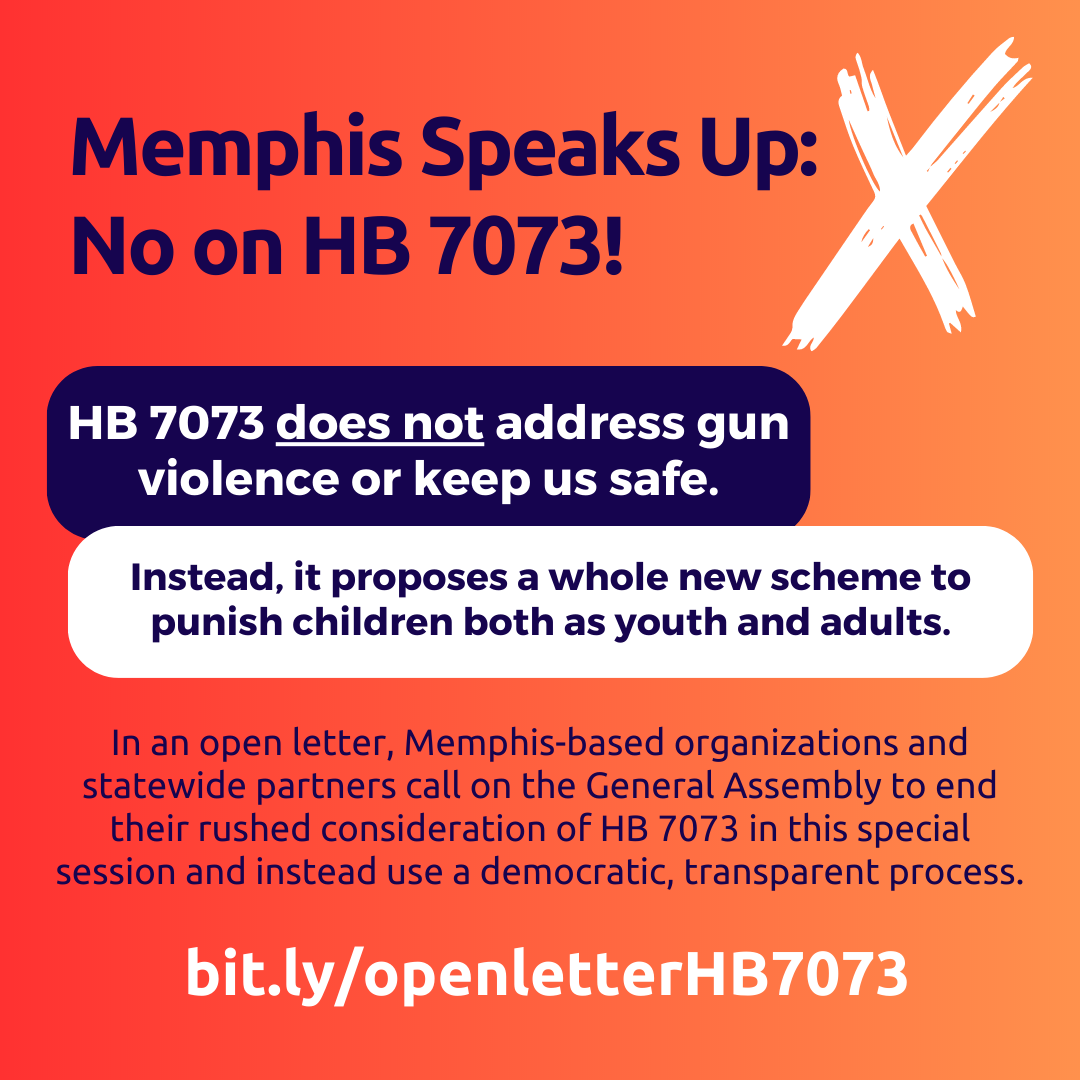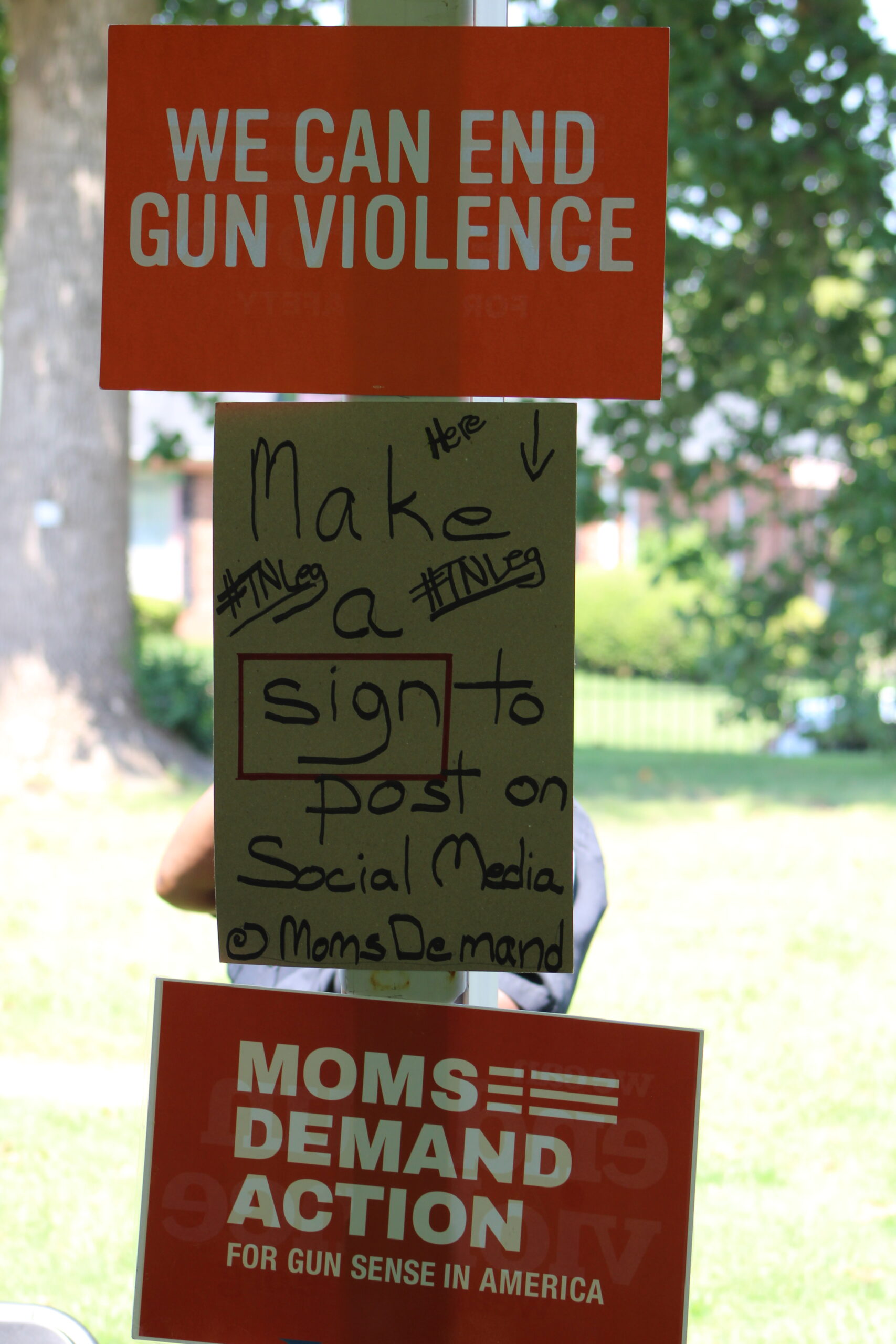Local and statewide organizations sent the below letter to state elected officials, Memphis Mayor Paul Young, and other Memphis/Shelby County leaders to set the record straight on what “blended sentencing” (as proposed in HB0430) truly means for our young people. As amended by Speaker Sexton, blended sentencing could result in children as young as 14 years old getting sentenced to an automatic five years in adult prison upon turning 19, without the right to a jury trial and even if they have not committed another offense.
A representative from our coalition hand-delivered the letter to HB0430 / SB0624’s sponsors, Rep. Mark White and Sen. Brent Taylor, during the People Against the State of TN rally on Wednesday, April 17. Today (Thursday, April 18), we sent it to Mayor Young, Mayor Harris, DA Mulroy, Judge Sugarmon, and other Memphis/Shelby County Leaders to correct misinformation and misunderstanding about blended sentencing that continue to proliferate in our community. The disturbing (and potentially unconstitutional) measures in this bill demonstrate the dangers in ongoing encouragement for the state to pass tough-on-crime legislation, as we saw with the recent letter to Gov. Lee from the Memphis Chamber and Chairman’s Circle.
We all want to see the thriving, flourishing, future-ready Memphis that Mayor Young outlined in his 100 Days Address, but throwing our young people into a cycle of punishment without a chance for rehabilitation will not lead us to that inspiring vision. We encourage our local elected and unelected leaders to do everything in their power to fight this bill in favor of enacting and funding restorative, rehabilitative, and preventive solutions.
Dear Shelby County and Memphis Leaders,
We are writing as your constituents and organizations concerned about community safety and rehabilitation for our youth. Many of our organizations and community members from various stakeholder groups have called for a means through which rehabilitative services can be provided to youth after their 19th birthday, without sending those youth to adult prison facilities.
Some of these organizations have also expressed support for an alternative to transferring youth to adult court when they are accused of committing serious offenses, particularly when they are close to aging out of the juvenile system. Generally referred to as “blended sentencing”, the term has referred to a broad range of potential policy implementations that may or may not align with goals to support youth, increase safety, limit harm, and prevent net widening for young people into the adult system.
Unfortunately, current legislation being presented as blended sentencing legislation does not meet these goals. We believe it is important to be clear on the current bills making their way through the legislature and encourage our elected leaders to stand against those that do not deliver on the initial promise of “blended sentencing.”
For months, HB0430 has been marketed as the blended sentencing proposal that would establish a rehabilitative alternative for youth considered for adult transfer. We are tremendously concerned and disappointed that the current bill does not deliver on this promise, primarily due to amendments from Speaker Sexton. Instead of creating alternatives to transfer, the bill:
establishes a new mandatory transfer pathway,
explicitly authorizes youth to be incarcerated in adult prisons without the right to a jury trial,
and forces judges to incarcerate youth in adult prisons after they have completed their juvenile sentences, even if they have not committed any new offenses.
As amended, this bill increases harm to youth, removes due process, and opens the floodgates to send young people to adult prison. In short, the bill now bears little resemblance to what we originally believed blended sentencing would bring to our community.
While we were told that blended sentencing could help to reduce youth imprisonment and recidivism by providing new rehabilitative services for young people within the juvenile system without the need to transfer them to adult prison, there is no funding attached to the bill for anything other than incarceration. The fiscal note on the bill dated March 5, 2024 has no mention of new spending on rehabilitative services, supervision, community-based services, or anything other than custody provided by the Department of Children’s services for youth while they remain in the juvenile system. Simply stated, the state fiscal assessment says that this bill will provide no new funds that might help prevent a young person from being sent to adult prison.
Similarly, we were told that blended sentencing could support young people by extending juvenile jurisdiction to provide a more developmentally appropriate environment and additional supports for emerging adults under 25. Once again, there is no language in the bill about rehabilitative services for youth over 19, only a statement that the youth will be committed “to the supervision of the department of correction” and that the youth “in a secure facility must be housed separate and removed from the general population.” The state fiscal assessment determined this bill will REQUIRE increased incarceration expenditures by the Department of Correction for youth over 19. This portion of the bill seems to be half-baked based on the promised solutions blended sentencing could provide, and ends up being a proposal to simply incarcerate young people in adult prisons under the false claim of “rehabilitation.”
From our analysis, HB0430 will not meet the calls from community members, organizations, and elected officials for increasing safety, decreasing the direct transfer of youth to adult prison, and increasing youth rehabilitation opportunities. As it currently stands, the bill clearly does not align with our shared commitment to fostering environments where young community members can learn from their mistakes and grow into responsible adults.
We must challenge proponents of blended sentencing to safeguard the rights and rehabilitation of our children. We encourage you to stand against any proposal that fails to affirmatively answer the following essential questions. This list serves as a quick and straightforward litmus test to evaluate the merits of proposed blended sentencing legislation:
- Is the proposal limited to older youth who have committed serious offenses who might otherwise not have time to be rehabilitated in the juvenile system?
- Does the proposal provide additional resources and opportunities for rehabilitation to reduce recidivism and improve access to education, employment, and other outcomes for young people?
- Does the proposal avoid mandatory transfers of youth to adult court or adult facilities, allowing for individualized consideration based on the specifics of each case?
- Are there due process protections comparable to those in transfer proceedings before a youth is sent to adult court, ensuring that we are not creating an easier path to adult prison with less due process?
- Do young people have an explicit right to counsel in all proceedings?
- Is there a presumption that the adult sentence is suspended unless the state actively seeks its imposition?
- Do the criteria for deciding whether a youth will receive the adult portion of their sentence offer multiple avenues to demonstrate successful rehabilitation, avoiding triggers based on non-criminal behavior?
- Does a youth have the right to petition for a review of their sentence?
- Does the adult sentence include probation, parole, or other community based options that allow youth to reintegrate into society?
Recognizing that HB0430 cannot answer “yes” to these questions, we should ask every proponent of the original promise of “blended sentencing” where they stand on ensuring that any final law meets these requirements. This may be Speaker Sexton’s version of blended sentencing, but it is not what we have discussed for the last two years. We encourage all of our elected officials and community leaders who have expressed support for blended sentencing in the past to let it be known that this is not the form of blended sentencing that Memphis & Shelby County want or need.
In Support of Safety and Our Young People,
ACLU of Tennessee
Black Clergy Collaborative of Memphis (BCCM)
Just City
Memphis Artists for Change
Memphis for All
MICAH – Memphis Interfaith Coalition for Action and Hope
Shelby Countywide Juvenile Justice Consortium
Stand for Children – Tennessee
The Equity Alliance
Whole Child Strategies
Youth Justice Action Council (YJAC)



















